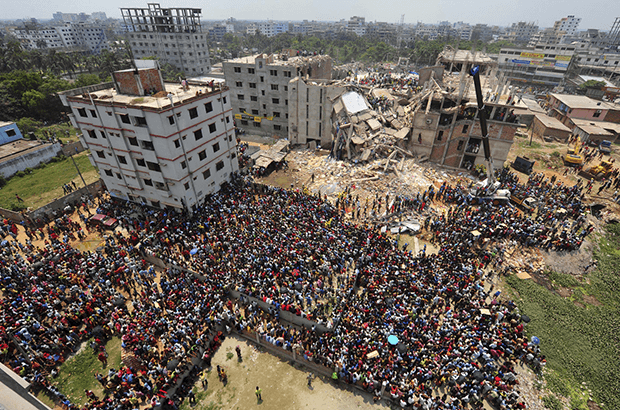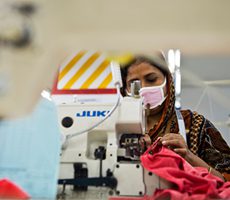- November 17, 2015
- By Liam Farrell
Brad Loewen ’86 has one of the most difficult jobs in the world: making one of its poorest countries safer.
As the chief inspector for the Accord on Fire and Building Safety in Bangladesh, Loewen is in charge of revolutionizing the country’s garment industry. The nation is the No. 2 producer of apparel worldwide, trailing only China, and notorious for hazard-ridden, overcrowded factories with lax worker protections and oversight.
 “My character is one that enjoys the challenge,” he says.
“My character is one that enjoys the challenge,” he says.
The accord was a response from a collection of brands, retailers and trade unions to the worst garment-factory accident in history: the 2013 Rana Plaza building collapse near the capital city of Dhaka that killed more than 1,100 people and injured another 2,000. Investigators found the building had been constructed with substandard materials and flouted building codes, with owners ordering workers back into the building even after cracks had appeared one day before the collapse.
The 200-plus brands signing the accord include H&M, Benetton, American Eagle Outfitters and Abercrombie & Fitch.
The accident brought intense scrutiny on the “fast fashion” consumer trend, wherein brands heave ever-changing lineups of cheap clothing at thrifty buyers. Although an easy answer for affluent Western consumers would have been to boycott Bangladesh’s merchandise, a widespread action would also put at risk a workforce of more than 4 million workers supporting the country’s $21 billion garment industry, responsible for 80 percent of Bangladesh’s exports.
Loewen says that combination puts consumers and brands in a difficult position.
“It’s not an easy answer,” he says. “To support those who are trying is the best we can do.”
Loewen, a native of Winnipeg, has been involved in public safety since becoming a firefighter at age 16, a decision he says was fueled as much by adrenaline seeking as an interest in public service. He searched for college programs in the field and earned a degree from UMD’s Department of Fire Protection Engineering. Since graduating, he has spent most of his career in government, recently as the chief building official for his home city.
“Our built environment is pretty safe (in the West). You are working away at the edges,” he says. “The opportunity to have a bigger impact … was very attractive.”
So attractive, in fact, that Loewen moved to Dhaka sight unseen, despite its regular ranking by The Economist as one of the least livable cities in the world (“bested” in 2015 only by war-torn Damascus, Syria). He says his son, a college student, and wife, a filmmaker and professor now splitting her time between Bangladesh and Winnipeg, “were overwhelmingly supportive.”
Loewen was the first person hired through the accord, and in addition to building a staff and getting hundreds of inspections under way, he was confronted by a society with a near-total absence of regulation. Some factory owners view the accord as an imposition, and Loewen has to focus on education as well—safety improvements often claimed as not required by Bangladesh law are often, in reality, just not enforced.
Striking a balance between education and enforcement has been critical for Loewen in gaining the community’s trust, says Rob Wayss, executive director of the accord.
“He’s very engaged. He’s present. He’s there every day and accessible,” Wayss says. “He’s not somebody who is just parachuting in.”
 More than 1,100 people were killed in the Rana Plaza factory collapse, making it the worst garment-factory accident in history.
More than 1,100 people were killed in the Rana Plaza factory collapse, making it the worst garment-factory accident in history.
The garment industry has mushroomed organically, Loewen says, with factories often growing from individual apartments into whole floors of residential buildings unsuited for an industrial purpose. Locked gates block secondary exits, fire doors are nonexistent, and electric wires hang haphazardly.
“When you need power somewhere, you just string it how you want to string it,” Loewen says.
So far, his staff has inspected the approximately 1,600 factories covered by the accord, and remediation plans are under way to address the 68,000 cited violations.
And even though factory owners could theoretically just opt out of the agreement and look for new business rather than renovate, Loewen says even those brands that haven’t signed the accord are monitoring whether any factories are delisted.
“That would carry a lot of weight,” he says.
The International Labor Rights Forum (ILRF) is one of the nongovernmental organizations serving as a watchdog on the accord. It has been putting pressure on brands such as H&M to move faster on repairs, and Liana Foxvog, the ILRF’s director of organizing and communications, says the true test for the accord will be during the remediation process.
But the accord has been “groundbreaking,” she says, in dramatically improving the quality of Bangladesh inspections.
“This is saving lives,” Foxvog says. “The accord is working to change a whole culture (of) maximizing profits rather than ensuring safe workers.”
